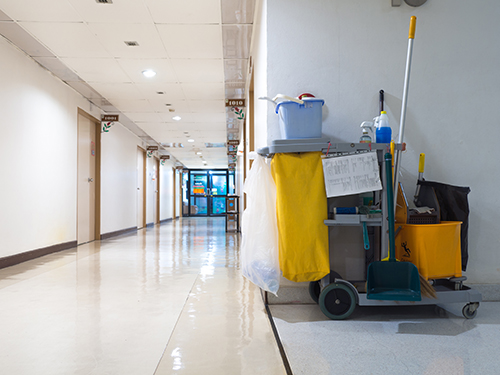




Ancillary roles do not involve direct care, but it is important to be aware there is a crossover between working in health and working in social care and ancillary roles are key to quality service delivery.
Ancillary roles are vital to the running of an organisation, for example, cook or kitchen assistant, housekeeper or domestic worker, driver or transport manager, maintenance worker.
A cook is vital to the smooth running of any social care setting. They will prepare, cook and serve meals to individuals, usually in a nursing or residential home, or in a day care centre. Their role includes monitoring kitchen stocks and ordering supplies, ensuring high standards of hygiene and cleanliness are maintained and planning meals to ensure the needs, wishes and preferences of individuals are met.
A housekeeper or domestic worker will make sure that the environment in any setting, for example residential or respite care, is safe, tidy and clean. The role might also include ensuring the environment is welcoming and comfortable for residents and visitors, storing hazardous substances, such as cleaning fluids, safely and ordering stock.
A driver or transport manager arranges or provides transport for individuals who need care and support. This could be to and from a day centre or to hospital appointments.
A maintenance worker in social care will carry out practical maintenance jobs, usually in a residential home or sheltered housing. This could include gardening, painting and decorating, repairing fixtures and fittings or doing health and safety inspections.
Nid yw rolau ategol yn cynnwys gofal uniongyrchol, ond mae'n bwysig bod yn ymwybodol bod trawsgroesi rhwng gweithio ym maes iechyd a gweithio ym maes gofal cymdeithasol ac mae rolau ategol yn allweddol i ddarparu gwasanaeth o ansawdd.
Mae rolau ategol yn hanfodol i weithrediad sefydliad, er enghraifft, cogydd neu gynorthwyydd cegin, ceidwad tŷ neu weithiwr domestig, gyrrwr neu reolwr trafnidiaeth, gweithiwr cynnal a chadw.
Mae cogydd yn hanfodol i weithrediad didrafferth unrhyw leoliad gofal cymdeithasol. Bydd yn paratoi, coginio a gweini prydau bwyd i unigolion, fel arfer mewn cartref nyrsio neu breswyl, neu mewn canolfan gofal dydd. Mae rôl cogydd yn cynnwys monitro stociau'r gegin ac archebu cyflenwadau, gan sicrhau bod safonau hylendid a glendid yn cael eu cynnal a chynllunio prydau bwyd i sicrhau bod anghenion, dymuniadau a dewisiadau unigolion yn cael eu bodloni.
Bydd ceidwad tŷ neu weithiwr domestig yn sicrhau bod yr amgylchedd mewn unrhyw leoliad, er enghraifft gofal preswyl neu seibiant, yn ddiogel, taclus a glân. Hefyd gallai'r rôl gynnwys sicrhau bod yr amgylchedd yn groesawgar ac yn gyfforddus i breswylwyr ac ymwelwyr, storio sylweddau peryglus, megis hylifau glanhau, yn ddiogel ac archebu stoc.
Mae gyrrwr neu reolwr trafnidiaeth yn trefnu neu'n darparu trafnidiaeth ar gyfer unigolion y mae angen gofal a chymorth arnyn nhw. Gall hyn fod yn gludiant i ganolfan dydd ac yn ôl neu i apwyntiadau yn yr ysbyty.
Bydd gweithiwr cynnal a chadw ym maes gofal cymdeithasol yn cyflawni swyddi cynnal a chadw ymarferol, fel arfer mewn cartref preswyl neu dai gwarchod. Gallai hyn gynnwys garddio, peintio ac addurno, atgyweirio gosodion a gosodyddion neu wneud arolygiadau iechyd a diogelwch.
Drag and drop the missing words into the text below.
Llusgwch a gollyngwch y geiriau coll yn y testun isod.
You scored … out of . Move some of the terms around to try to improve your score.
Well done. You scored … out of .
You scored … out of . Click reset to try the activity again.
You scored … out of . Move some of the terms around to try to improve your score.
Well done. You scored … out of .
You scored … out of . Click reset to try the activity again.
Eich sgôr yw … allan o . Symudwch rhai o'r termau o gwmpas i geisio gwella eich sgôr.
Da iawn. Eich sgôr yw … allan o .
Eich sgôr yw … allan o . Cliciwch ‘ailosod’ er mwyn rhoi cynnig arall ar y gweithgaredd.
Eich sgôr yw … allan o . Symudwch rhai o'r termau o gwmpas i geisio gwella eich sgôr
Da iawn. Eich sgôr yw … allan o .
Eich sgôr yw … allan o . Cliciwch ‘ailosod’ er mwyn rhoi cynnig arall ar y gweithgaredd.

Unlike ancillary roles, direct roles include supporting individuals with their non-clinical needs.
Direct care roles involve working with individuals who need care and support. These roles include an activities worker, care worker, personal assistant, rehabilitation worker, advocacy worker and an outreach worker.
The role of an activities worker involves designing and overseeing activities for individuals who need care and support. This could be in a residential care home, a community care setting or in an individual’s home. The activities stimulate new interests and skills and are designed specifically to meet an individual’s needs.
The role often includes talking to people about what activities they like to do, developing and providing activities for individuals and groups, booking external suppliers to provide entertainment and organising trips out in the local community.
A care worker supports individuals who need direct care and support and is responsible for an individual’s overall comfort and independence. Care workers could work in a residential or nursing home, in individuals’ own homes, or out in the community. They could also be a live-in carer, living with an individual over a specified time period. The role often includes supporting individuals with social and physical activities, helping with personal care, such as support with showering and dressing, monitoring an individual’s health, for example by checking body temperatures and fluid intake, and helping individuals to live as independently as possible.
Personal assistants, or PAs as they’re often called, are employed directly by an individual, rather than an organisation, to help them live as independently as possible. The things a PA does depend on the needs of their employer, but they could include things like assisting with mobility, hobbies, helping to cook meals, visiting friends and family, personal care, going on day trips or holidays, attending meetings and taking notes. Some PAs also help their employer to manage a larger team of PAs.
The role of a rehabilitation worker involves supporting individuals to live as independently as possible, perhaps following an illness or accident. Rehabilitation workers support individuals with many aspects of their everyday living, including personal, emotional and social care. The role may involve doing specialist assessments to identify what care and support an individual needs, working with other professionals, such as social workers and housing support workers, to help people, teaching individuals life skills, such as making a cup of tea, cooking or reading braille, and organising activities, such as sports, drama or educational activities.
Advocacy seeks to ensure that individuals, particularly those who are most vulnerable, have their voice heard on issues that are important to them, and have their views and wishes genuinely considered when decisions are being made about their lives.
In this role, an advocacy worker will empower individuals to express their views, wishes and choices and remain as involved as possible in all decisions which affect them. For example, an advocacy worker might provide support for someone with dementia. As part of their role they might support them to make decisions about getting carers in their own home or moving into residential care.
Outreach workers are often employed to help families through both short-term and long-term difficulties. They provide emotional support as well as practical support, for example, signposting to other services or support.
Yn wahanol i rolau ategol, mae rolau uniongyrchol yn cynnwys cefnogi unigolion gyda'u hanghenion nad ydynt yn glinigol.
Mae rolau gofal uniongyrchol yn cynnwys gweithio ag unigolion y mae angen gofal a chymorth arnynt. Mae'r rolau hyn yn cynnwys gweithiwr gweithgareddau, gweithiwr gofal, cynorthwyydd personol, gweithiwr adferiad, gweithiwr eiriolaeth a gweithiwr estyn allan.
Ymysg rolau gweithiwr gweithgareddau mae dylunio a goruchwylio gweithgareddau ar gyfer unigolion y mae angen gofal a chymorth arnynt. Gallai hyn fod mewn cartref gofal preswyl, lleoliad gofal cymunedol neu yng nghartref unigolyn. Mae'r gweithgareddau yn ysgogi diddordebau a sgiliau newydd ac maen nhw wedi'u dylunio'n arbennig i fodloni anghenion unigolyn.
Yn aml, mae'r rôl yn cynnwys siarad â phobl am ba weithgareddau y maen nhw'n hoffi'u gwneud, datblygu a darparu gweithgareddau ar gyfer unigolion a grwpiau, archebu cyflenwyr allanol i ddarparu adloniant a threfnu teithiau allan yn y gymuned leol.
Mae gweithiwr gofal yn cefnogi unigolion y mae angen gofal a chymorth uniongyrchol arnynt ac mae'n gyfrifol am gysur ac annibyniaeth cyffredinol unigolyn. Gall gweithiwr gofal weithio mewn cartref preswyl neu nyrsio, yng nghartrefi unigolion, neu allan yn y gymuned. Gall hefyd fod yn ofalwr sy'n byw gydag unigolyn am gyfnod penodol o amser. Yn aml, mae'r rôl yn cynnwys cefnogi unigolion gyda gweithgareddau cymdeithasol a chorfforol, helpu gyda gofal personol, megis cefnogaeth gyda chael cawod a gwisgo, monitro iechyd unigolyn, er enghraifft drwy wirio tymereddau'r corff a chymeriant hylifau, a helpu unigolion fyw mor annibynnol â phosibl.
Caiff cynorthwywyr personol (PAs) eu cyflogi'n uniongyrchol gan unigolyn, yn hytrach na sefydliad, i'w helpu i fyw mor annibynnol â phosibl. Mae'r pethau y mae PA yn eu gwneud yn dibynnu ar y cyflogwr, ond gallant gynnwys pethau fel cynorthwyo â symudedd, hobïau, helpu i goginio prydau bwyd, ymweld â ffrindiau a theulu, gofal personol, mynd ar deithiau dydd neu wyliau, mynychu cyfarfodydd a gwneud nodiadau. Mae rhai cynorthwywyr hefyd yn helpu'r cyflogwr i reoli tîm mwy o gynorthwywyr.
Mae rôl gweithiwr adferiad yn cynnwys cefnogi unigolion i fyw mor annibynnol â phosibl, ar ôl salwch neu ddamwain, efallai. Mae gweithwyr adferiad yn cefnogi unigolion gyda llawer o agweddau ar eu bywyd bob dydd, yn cynnwys gofal personol, emosiynol a chymdeithasol. Gallai'r rôl gynnwys cyflawni asesiadau arbenigol i nodi pa fath o ofal a chymorth y mae eu hangen ar unigolyn, gweithio gyda gweithwyr proffesiynol eraill, megis gweithwyr cymdeithasol a gweithwyr cefnogi tai, i helpu pobl, addysgu sgiliau bywyd, megis gwneud paned o de, coginio neu ddarllen braille, a threfnu gweithgareddau, megis chwaraeon, drama neu weithgareddau addysgiadol.
Nod eiriolaeth yw sicrhau bod unigolion, yn enwedig y rhai sydd fwyaf agored i niwed, yn cael lleisio eu barn am faterion sy'n bwysig iddyn nhw, a bod eu safbwyntiau a'u dymuniadau yn cael eu hystyried o ddifrif pan fydd penderfyniadau yn cael eu gwneud am eu bywydau.
Yn y rôl hon, bydd gweithiwr eiriolaeth yn rhoi'r grym i unigolion fynegi eu safbwyntiau, dymuniadau a'u dewisiadau ac i chwarae gymaint o ran ag sy'n bosibl yn y broses o wneud penderfyniadau sy'n effeithio arnyn nhw. Er enghraifft, gall gweithiwr eiriolaeth ddarparu cefnogaeth i rywun sydd â dementia. Fel rhan o'i rôl gallai gynnig cefnogaeth i'r person o ran gwneud penderfyniadau am gael gofalwyr yn ei gartref neu symud i ofal preswyl.
Mae gweithwyr estyn allan yn aml yn cael eu cyflogi i helpu teuluoedd drwy anawsterau tymor byr a thymor hir. Maen nhw'n darparu cefnogaeth emosiynol yn ogystal â chefnogaeth ymarferol, er enghraifft, cyfeirio at wasanaethau neu gefnogaeth eraill.
Select the correct answer for each of the questions below.
Dewiswch yr ateb cywir ar gyfer bob un o'r cwestiynau isod.

These roles involve managerial responsibility and being responsible for managing a team, e.g. team leader or supervisor, manager, specialist coordinator, such as dementia or end of life care coordinator.
There are lots of different jobs which fall under the management category in adult social care, from being a supervisor, senior personal assistant or team leader, to being the Chief Executive Officer (CEO) of a residential care setting or business.
Supervisors have some responsibility for the quality of care an organisation provides and are involved in the supervision of the work of other care and front-line workers.
First line managers are responsible for the day to day provision of social care services. The role of a first line manager involves supporting staff. They have a key role in ensuring that the standard of care delivered is consistently high. Examples of roles in this category are team leaders, service managers and residential wardens.
Middle managers are often responsible for overseeing the organisation and managing whole departments. For example, duties include identifying staffing requirements and managing budgets. Workers in this category could be area managers, managers or department heads.
Senior managers have overall responsibility for an organisation, and their main job role includes giving the organisation leadership, management and direction. They also have overall responsibility for the quality of care provided and the health and safety of staff, people using care and support and any visitors. Senior managers could be owners, directors or chief executives.
Mae'r rhain yn cynnwys cyfrifoldeb rheoli a bod yn gyfrifol am reoli tîm, e.e. arwienydd tîm neu oruchwyliwr, rheolwr, cydlynydd arbenigol, megis cydlynydd gofal dementia neu ddiwedd oes.
Mae llawer o swyddi gwahanol sy'n rhan o gategori rheoli ym maes gofal cymdeithasol oedolion, o fod yn oruchwyliwr, uwch gynorthwyydd personol neu arweinydd tîm i fod yn Brif Swyddog Gweithredol (CEO) lleoliad neu fusnes gofal preswyl.
Mae gan oruchwylwyMae gan oruchwylwyr rywfaint o gyfrifoldeb am ansawdd y gofal y mae sefydliad yn ei ddarparu ac maent yn ymwneud â goruchwylio gwaith gweithwyr gofal a rheng flaen eraill.
Rheolwyr llinell gyntaf sydd yn gyfrifol am ddarpariaeth dydd i ddydd gwasanaethau gofal cymdeithasol. Mae rôl rheolwr llinell gyntaf yn cynnwys cefnogi staff. Mae'n chwarae rôl allweddol wrth sicrhau bod safon y gofal a ddarperir yn gyson uchel. Enghreifftiau o rolau yn y categori hwn yw arweinwyr tîm, rheolwyr gwasanaeth a wardeniaid preswyl.
Mae rheolwyr canol yn aml yn gyfrifol am oruchwylio'r sefydliad ac am reoli adrannau cyfan. Er enghraifft, mae'r dyletswyddau'n cynnwys nodi gofynion staffio a rheoli cyllidebau. Gallai'r gweithwyr yn y categori hwn fod yn rheolwyr ardal, rheolwyr neu benaethiaid adran.
Mae gan uwch reolwyr gyfrifoldeb cyffredinol am sefydliad, ac mae ei brif ddyletswydd swydd yn cynnwys rhoi arweinyddiaeth, rheolaeth a chyfeiriad i'r sefydliad. Hefyd mae ganddyn nhw gyfrifoldeb cyffredinol am ansawdd y gofal a ddarperir ac am iechyd a diogelwch staff, pobl sy'n defnyddio gofal a chymorth ac unrhyw ymwelwyr. Gall uwch reolwyr fod yn berchenogion, cyfarwyddwyr neu brif weithredwyr.
Find out about the different roles and responsibilities of managers within the social care sector in Wales.
Dysgwch am rolau a chyfrifoldebau gwahanol rheolwyr yn y sector gofal cymdeithasol yng Nghymru.
Drag and drop the missing words into the text below.
Llusgwch a gollyngwch y geiriau coll yn y testun isod.
The position of manager is a front-line leadership role within a residential care setting, for example. The manager is responsible for all aspects of the day-to-day operations, including recruiting and managing staff teams, managing budgets and ensuring that the quality of the services provided meets the required standards.
The position of manager is a front-line leadership role within a residential care setting, for example. The manager is responsible for all aspects of the day-to-day operations, including recruiting and managing staff teams, managing budgets and ensuring that the quality of the services provided meets the required standards.
You scored … out of . Move some of the terms around to try to improve your score.
Well done. You scored … out of .
You scored … out of . Click reset to try the activity again.
You scored … out of . Move some of the terms around to try to improve your score.
Well done. You scored … out of .
You scored … out of . Click reset to try the activity again.
Mae rôl rheolwr yn un sy'n darparu arweinyddiaeth llinell flaen mewn lleoliad gofal preswyl, er enghraifft. Mae'r rheolwr yn gyfrifol am bob agwedd ar y swyddogaethau dydd-i-ddydd, gan gynnwys recriwtio a rheoli timau staff, rheoli cyllidebau a sicrhau bod ansawdd y gwasanaethau a ddarperir yn bodloni'r safonau.
Mae rôl rheolwr yn un sy'n darparu arweinyddiaeth llinell flaen mewn lleoliad gofal preswyl, er enghraifft. Mae'r rheolwr yn gyfrifol am bob agwedd ar y swyddogaethau dydd-i-ddydd, gan gynnwys recriwtio a rheoli timau staff, rheoli cyllidebau a sicrhau bod ansawdd y gwasanaethau a ddarperir yn bodloni'r safonau.
Eich sgôr yw … allan o . Symudwch rhai o'r termau o gwmpas i geisio gwella eich sgôr.
Da iawn. Eich sgôr yw … allan o .
Eich sgôr yw … allan o . Cliciwch ‘ailosod’ er mwyn rhoi cynnig arall ar y gweithgaredd.
Eich sgôr yw … allan o . Symudwch rhai o'r termau o gwmpas i geisio gwella eich sgôr
Da iawn. Eich sgôr yw … allan o .
Eich sgôr yw … allan o . Cliciwch ‘ailosod’ er mwyn rhoi cynnig arall ar y gweithgaredd.

Other social care support roles include housing support officer, volunteer coordinator, welfare rights officer, trainer or assessor, and employment advisor.
A housing support officer will provide housing related support and advice to individuals to help them live independently and maintain their tenancy. They may be working in sheltered accommodation, supported living services, a hostel for the homeless or supported housing. A housing support officer could be working as a residential warden, ensuring a safe and secure environment for all residents and acting as the first point of contact for care staff and contractors. This role could include assessing the needs of individuals who need housing, supporting individuals with many aspects of everyday living - including personal finance, cooking and shopping - carrying out inspections and health and safety checks, working in teams with other professionals, such as social workers, to make sure individuals get the right housing and support and providing advice and informal counselling when necessary.
A volunteer coordinator is responsible for a team of volunteers to ensure they have the right skills and values and provide a high-quality service. Volunteer coordinators may work for social care employers to run an internal volunteering scheme, or with local authorities or charities to manage volunteers locally or nationally.
A welfare rights officer provides a wide range of support, or can specialise in one area, such as housing, or with one client group, such as carers. They generally work in a public advice centre or for a charity, community group or housing association.
A trainer or assessor will be responsible for the design and delivery of learning and development sessions in relation to the knowledge and skills of staff. Trainers or assessors might work for a social care employer and deliver training to all staff within the organisation or could work for a training provider who delivers training to different social care employers.
An employment advisor will support individuals who need care and support to find and maintain employment. They can work in advice centres, for charities or in the community.
Ymysg y rolau cefnogi gofal cymdeithasol eraill mae swyddog cefnogaeth tai, cydlynydd gwirfoddolwyr, swyddog hawliau lles, hyfforddwr neu aseswr, a chynghorydd cyflogaeth.
Bydd swyddog cefnogaeth tai yn darparu cymorth a chyngor sy'n ymwneud â thai i unigolion i'w helpu i fyw'n annibynnol ac i gynnal eu tenantiaeth. Efallai y bydd yn gweithio mewn llety cysgodol, gwasanaethau byw â chymorth, hostel ar gyfer y di-gartref neu dai â chefnogaeth. Gallai swyddog cefnogaeth tai fod yn gweithio fel warden preswyl, gan sicrhau amgylchedd saff a diogel ar gyfer yr holl breswylwyr ac ymddwyn fel pwynt cyswllt cyntaf ar gyfer staff gofal a chontractwyr. Gallai'r rôl hon gynnwys asesu anghenion unigolion y mae angen cartref arnynt, gan gefnogi unigolion gyda llawer o agweddau ar fywyd bob dydd – gan gynnwys cyllid personol, coginio a siopa – cynnal arolygiadau a gwiriadau iechyd a diogelwch, gweithio mewn timau gyda gweithwyr proffesiynol eraill, megis gweithwyr cymdeithasol, i sicrhau bod unigolion yn cael y tai cywir a'r gefnogaeth gywir, a darparu cwnsela anffurfiol pan fo angen.
Mae cydlynydd gwirfoddolwyr yn gyfrifol am dîm o wirfoddolwyr i sicrhau bod y sgiliau a'r gwerthoedd cywir ganddyn nhw a'u bod yn darparu gwasanaeth o ansawdd uchel. Gall cydlynwyr gwirfoddolwyr weithio i gyflogwyr gofal cymdeithasol er mwyn cynnal cynllun gwirfoddoli mewnol, neu gydag awdurdodau neu elusennau lleol i reoli gwirfoddolwyr yn lleol neu'n genedlaethol.
Mae swyddog hawliau lles yn cynnig amrywiaeth eang o gefnogaeth, neu gallai arbenigo mewn un maes, megis tai, neu gydag un grŵp o gleientiaid, megis gofalwyr. Yn gyffredinol, bydd yn gweithio mewn canolfan cyngor i'r cyhoedd neu ar gyfer elusen, grŵp cymunedol neu gymdeithas tai.
Bydd hyfforddwr neu aseswr yn gyfrifol am ddylunio a chyflwyno sesiynau dysgu a datblygu sy'n gysylltiedig â gwybodaeth a sgiliau staff. Efallai y bydd hyfforddwyr neu aseswyr yn gweithio i gyflogwr gofal cymdeithasol ac yn darparu hyfforddiant i'r holl staff yn y sefydliad neu gallan nhw fod yn gweithio i ddarparwr hyfforddiant sy'n darparu hyfforddiant i gyflogwyr gofal cymdeithasol gwahanol.
Bydd cynghorydd cyflogaeth yn cefnogi unigolion sydd angen gofal a chymorth i ganfod a chadw cyflogaeth. Gallai weithio mewn canolfannau cyngor, ar gyfer elusennau neu yn y gymuned.

Regulated professional roles require a worker being registered with a regulated body to practice. This involves achieving the required qualifications which might include an undergraduate degree or diploma, e.g. social worker, counsellor.
Social workers provide advice and emotional support to help individuals adjust to changes in their lives, caused by illness, age related problems, disability or bereavement. Social workers may also support individuals who suffer from mental illnesses, such as depression, anxiety, schizophrenia and personality disorders. Social workers discuss the care the individual would like and then reassess their needs over a set period of time. They often work as part of a team and are responsible for a number of cases which all might need a different approach. Social workers also need to work closely with organisations, such as the police, health services, schools and probation services.
Counsellors may work with individuals who are coming to terms with bereavement, living with a long-term condition or experiencing problems with drug or alcohol addiction, for example. In this role, counsellors help individuals to overcome their challenges and to make appropriate changes to their lives. The role might include giving individuals the opportunity to talk and work through their feelings, listening to individuals and asking questions to encourage them to reflect on their experiences or encouraging people to cope with challenges and make positive changes in their lives.
A registered nurse practitioner should be fully trained and have an official certificate. Registered nurses in adult social care could work in a nursing home or out in the community. Nurses in adult social care might also work caring for adults, elderly individuals and others who are ill, injured or have physical disabilities. They could also work with individuals who have learning difficulties to help them become as independent as possible.
Mae rolau proffesiynol wedi'u rheoleiddio yn ei gwneud yn ofynnol bod gweithiwr wedi'i gofrestru â chorff rheoledig cyn gweithio. Mae hyn yn cynnwys cyflawni'r cymwysterau gofynnol a allai gynnwys gradd israddedig neu ddiploma, e.e. gweithiwr cymdeithasol, cwnselydd.
Mae gweithwyr cymdeithasol yn rhoi cyngor a chefnogaeth emosiynol er mwyn helpu unigolion i addasu i newidiadau yn eu bywydau, a achosir gan afiechyd, problemau sy'n ymwneud ag oedran, anabledd neu brofedigaeth. Gall gweithwyr cymdeithasol hefyd gefnogi unigolion sy'n dioddef o afiechydon meddwl, megis iselder, gorbryder, sgitsoffrenia ac anhwylderau personoliaeth. Bydd gweithwyr cymdeithasol yn trafod y gofal y byddai'r unigolyn yn ei hoffi ac yna'n ailasesu ei anghenion dros gyfnod penodol o amser. Yn aml, maent yn gweithio yn rhan o dîm ac maen nhw'n gyfrifol am nifer o achosion, ac efallai y bydd angen mynd i'r afael â phob un yn wahanol. Hefyd mae angen i weithwyr cymdeithasol weithio'n agos â sefydliadau, megis yr heddlu, gwasanaethau iechyd, ysgolion a gwasanaethau prawf (probation services).
Efallai y bydd cwnselwyr yn gweithio ag unigolion sy'n dygymod â phrofedigaeth, yn byw gyda chyflwr tymor hir neu'n cael profiad o broblemau gyda chaethiwed i gyffuriau neu alcohol, er enghraifft. Yn y rôl hon, mae cwnselwyr yn helpu unigolion i oresgyn eu heriau ac i wneud newidiadau priodol i'w bywydau. Gallai'r rôl gynnwys rhoi cyfle i unigolion siarad a gweithio drwy'u teimladau, gwrando ar unigolion a gofyn cwestiynau i'w hannog i fireinio ar eu profiadau neu annog pobl i ymdopi â heriau ac i wneud newidiadau cadarnhaol yn eu bywydau.
Dylai ymarferwr nyrs cofrestredig fod wedi'i hyfforddi'n llawn a dylai fod ganddo dystysgrif swyddogol. Gall nyrsys cofrestredig mewn gofal cymdeithasol oedolion weithio mewn cartref nyrsio neu allan yn y gymuned. Gallai nyrsys mewn gofal cymdeithasol oedolion hefyd weithio drwy ofalu am oedolion, unigolion oedrannus a phobl eraill sy'n sâl, wedi'u hanafu neu sydd ag anableddau corfforol. Efallai y byddan nhw hefyd yn gweithio ag unigolion sydd ag anawsterau dysgu i'w helpu i fod mor annibynnol â phosibl.